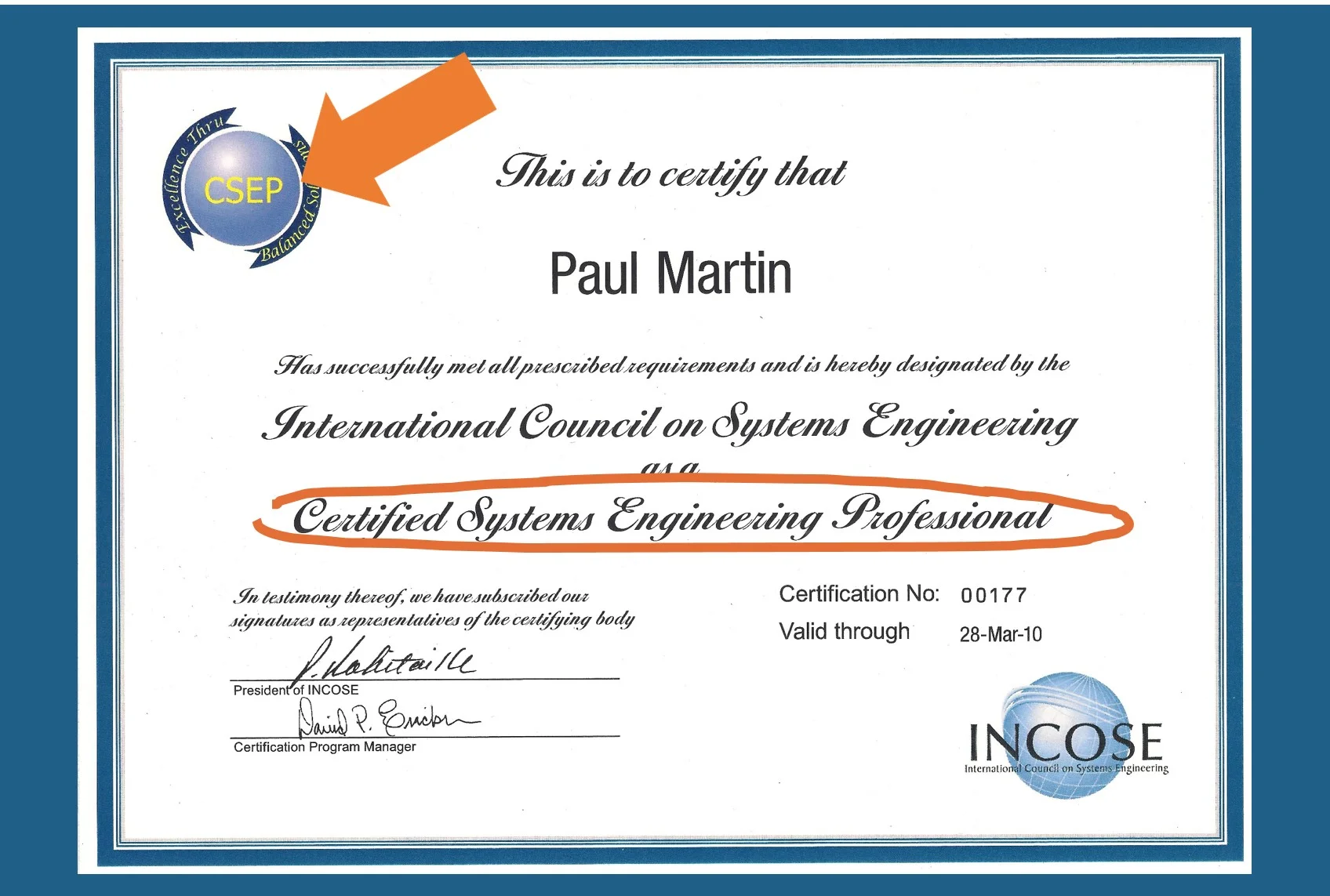As we were starting to set up SE Scholar website, my partner did a quick search of my name and CSEP course. Most of the results were announcements from my local INCOSE incose-cc.org website where I was Communications Officer, so that makes sense. However, about the fifth or sixth result down was an article from American Society of Mechanical Engineers (ASME).
As I started to read the article I was shocked to find it filled with extensive quotes from me. And some of the quotes weren’t actually mine either. When did I get interviewed for an ASME article dealing with INCOSE certification? Then I looked at the date. September 2012. Oh, that was a while back. And then I remembered an e-mail conversation I had with a reporter a few years back. I searched my e-mail and found the exchange. I'm including my full answers to his questions below so you can see how the reporter used my quotes. It was a shame he attributed me to a fantastic quote from IEEE Spectrum. I just wanted to set the record straight. I wish I had said those things about Systems Engineering but really it was Robert N. Charette the author of "What's Wrong with Weapons Acquisitions?"
|
---------- Forwarded message ---------- From: Paul Martin Date: Tue, Jul 24, 2012 at 6:41 PM Subject: Re: Be a source for a story on systems engineering for ASME To: mark crawford Hey, Mark below is my answers (and attached as well). I ask two things:
I know I got wordy there but I hope it answers your questions. Let me know if you need more information. Paul B Martin, ESEP On Tue, Jul 10, 2012 at 9:00 PM, mark crawford wrote: Hi Paul, I am a freelance writer and write 600-800-word articles from time to time for the American Society of Mechanical Engineer’s website. I am doing one on “certifications” and want to write about systems engineering certification and noticed INCOSE has a Systems Engineering Professional Certification. I thought that would be a good topic, as well as systems engineering certification in general—why is this important, is it in more demand, etc. Then I found your references as an instructor for the SEP certification process and thought you’d be a great source for this story. I am hoping that you’d like to share some insights. I have some questions below—if you are interested in being part of the story, I thought you could shoot me back some answers to the questions and then I could follow up if needed via e-mail or phone. Hope this interests you! What is systems engineering and why is it important, especially in a global sense? One of the reasons Systems Engineers are so important is they play a critical role in the technical management, development, and acquisition of complex technology systems. They are the professionals responsible for planning, coordinating, and overseeing group efforts that translate operational need into technology solution, and whose tools and skills determine whether a system will meet cost, schedule, and performance goals. Because systems engineers are central to a technology solution's success, they are in great demand by industry and government. IEEE Spectrum recently published an article that highlights the need for a stronger and more vibrant Systems Engineering profession. The lead article outlined the woes and tribulations of DoD's Weapons Acquisitions System. The article is appropriately called: "What's Wrong with Weapons Acquisitions?" This article explains how Systems Engineers are the key components to the process. Only problem is there are way too few. "Another factor contributing to program failure is the shortage of technically trained people, especially systems engineers. A systems engineer translates technical needs into an overall system architecture that creates the best operational capability at the most affordable cost. As a project proceeds and goals or needs shift, systems engineers have to determine the difficult but necessary cost, schedule, and performance trade-offs to keep everything on track. As programs get bigger and more complex, the need for rigorous systems engineering increases." This quote is not only the best explanation of what SEs do but also explains why we are so important. Let me point you to INCOSE's answer to the question >>HERE<< and also to great position paper written by our INCOSE President, John Thomas, called Why SEs Are Essential How quickly is it growing as a discipline? According to CNNMoney.com the best job in America for 2009 is a: Systems Engineer. The article mentions "some jobs might also require certification as a certified systems engineering professional (CSEP)." Even so we didn't make the top ten in 2010 or 2011. You can always cite the INCOSE own statistics of the societies growth. We have over 8000 members. But to put that in perspective, PMI has over 600,000 members and ASME has 120,000 members. I believe we are NOT growing fast enough. Any misconceptions that engineers in general may have about systems engineering that need to be corrected? I make two very important points to my students in my SE Graduate class at UMBC:
Why is certification important? As the INCOSE SEP webpage points out, the certification "Formally recognizes your Systems Engineering capabilities." As an aside, some people tend to place SE under Information Technology (IT). This kind of bugs me to no end. And INCOSE, with this certification initiative, is doing its best to stamp out this misconception. SE is more than IT. IT is just a tool used by SE either as part of a solution or as part of the development environment. During my job search a few years back I kept getting recruiters asking for a more IT related System Engineering work, i.e. "Do you know UNIX or JAVA? How good are your System administration skills in Unix, Linux, and/or Windows platforms? Do you have experience with VMware ESX server, Lab Manager, Virtual Infrastructure Client? Do you have the ability to write basic scripts using shell scripting or Perl?" I got so fed up I created a standard reply: “Thank you for the info but I'm not really an IT guy or software development guy. I help PMs and their Program Offices with the technical aspects of acquiring new systems and capabilities for DoD. Milestone Documentation, Architecture review, Requirement Tracability, Validation and Verification of requirements, test planning via TEMP development, etc. Look at chapter 4.1 of the Defense Acquisition Guidebook. That will give you a good understanding of what I do. Bottom Line is my strength is in Systems Engineering/Technical Advisory (SETA) work.” I know it's kind of snippy but it was the best way for me to deal with it. I guess that whole answer could have gone under your "misconception" question. With your program, what do you have to do to get certified? What does your program entail? Obtaining a CSEP is not easy, but that’s what makes it so valuable. You have to demonstrate your real world experience against 14 SE activities via a lengthy application as well as supply three references to verify that experience. Then you need to pass a two-hour, 120-question, multiple-choice exam. Hard but worth it. Details are on the INCOSE SEP Website. Any best final advice/words of wisdom about getting certified? A lot of my students in my Certified Systems Engineering Professional (CSEP) Preparation course at the UMBC Training Center seem to focus too much on the Exam. My advice is to concentrate on the filling out the application and getting your three references first. It's more time consuming then you'll realize and you need to spend that time to get it right. Once your application is approved you'll have plenty of time to study for the exam. And of course you can take my class to help you out in that regard. THANKS!! Mark Crawford |









